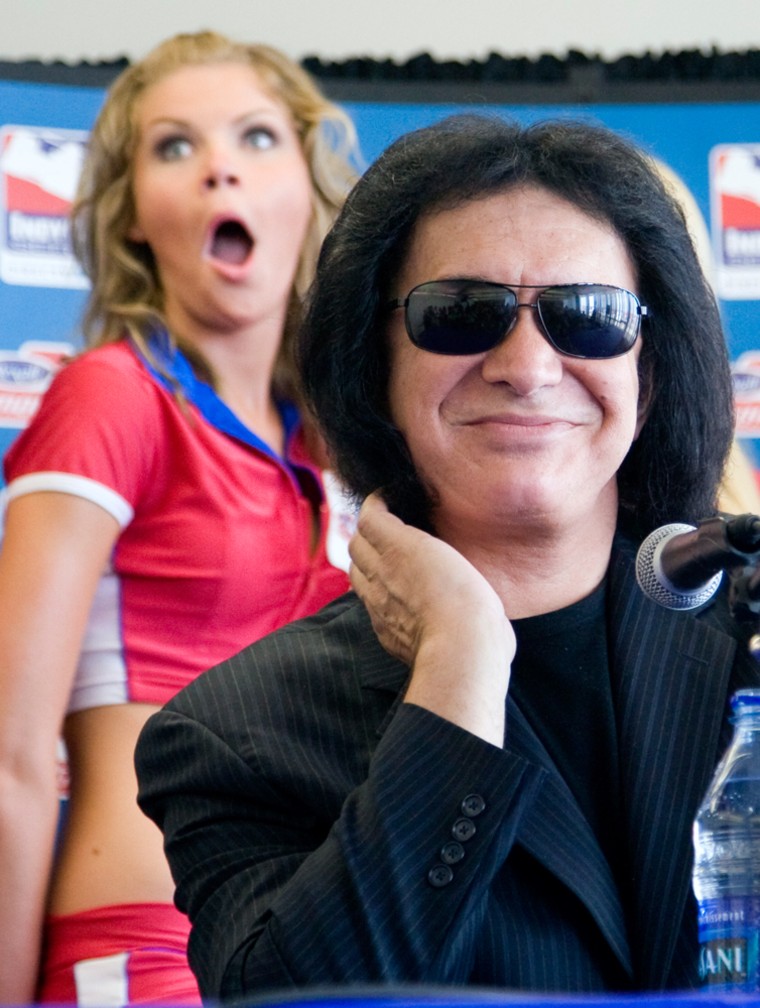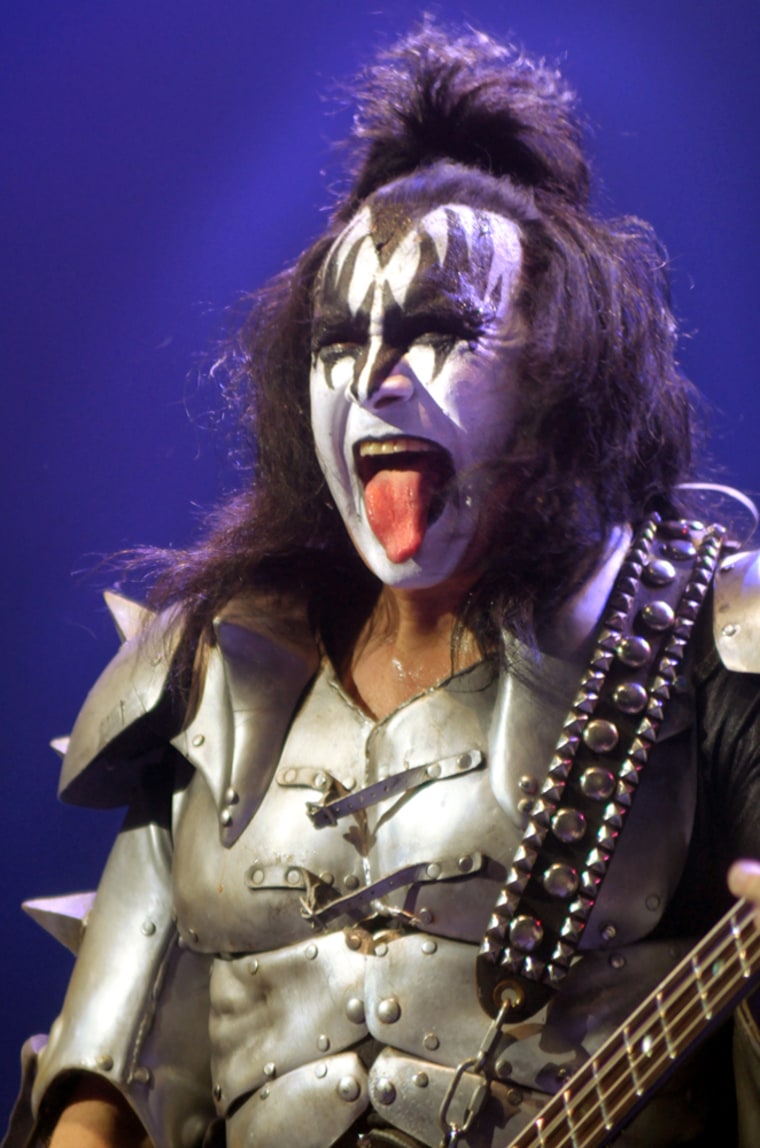As the fire-spitting frontman for the rock band KISS, Gene Simmons has put on his kabuki make-up and donned his platform dragon boots for the past 35 years. But for Simmons, KISS is just, well, his night job.
Born Chaim Witz in Haifa, Israel, Simmons came to America as an eight-year-old boy and says he has been living the American Dream ever since. Known for both his music and his business acumen, he's the force behind thousands of licensed KISS products and numerous ventures, including his discontinued magazine Gene Simmons' Tongue, Simmons Records, clothing line Moneybag, and the brand marketing firm Simmons Abramson Marketing, the outfit behind the "I Am Indy" Campaign. He's also continuing to keep his brand in the public spotlight: His reality TV show Gene Simmons Family Jewels is coming back for a fourth season on A&E, he has a new reality show called Jingles on tap, and in July he released his tome on prostitution, Ladies of the Night.
Simmons recently spoke with Businessweek staff writer Stacy Perman about entrepreneurship, failure, and all things Gene Simmons. Edited excerpts of their conversation follow.
Q: Which do you consider yourself first, a rock star or an entrepreneur?
A: That's an interesting question and the simple answer is a bit of both. Nobody does just one thing. But the real difference between being an entrepreneur and everyone else in the world is the ability to monetize. I am an entrepreneur in the classic mold. No matter what I do — outside of sticking my tongue out — I tend to make money, and quite a bit in non-KISS stuff.
Q: How did you understand so early that you could leverage KISS into other business ventures?
A: When the band was starting off, we noticed that T-shirts and non-music items were earning a substantial amount of money. KISS quickly became a multi-headed beast: rock band and rock 'n' roll brand — and the only one to have endured the ages and decades of fads and fashions. Today we have 3,000 licensed products, everything from condoms to caskets. We have you coming and going.
Q: Where would you say got your business education?
A: The United States of America. The best school is the street, and most successful entrepreneurs did not go to Wharton. Both Google and Hewlett-Packard were created in a garage. The difference between those that become a Buffett success — and I don't mean Jimmy — have an innate inborn connection. Their snouts are close to the ground. If you look at the CEOs of some the most successful companies in the world like IKEA, they never fly first class. They always go economy. Sam Walton of Wal-Mart had a second-hand car and lived in the middle of nowhere.

A: I fly economy. I do often fly first class, but I don't travel with a posse, or bodyguard, or an assistant. I use other people's infrastructure. For instance, I am going to address the AARP convention in Washington, D.C. I will fly first class to New York on AARP's dime, get into a town car, stay not in a grand suite, but a nice hotel room. I don't pretend to be poor, but somewhere in the middle is O.K.
Q: How do you identify a business opportunity?
A: I trust my gut. I have to have an emotional connection to what I am ultimately selling because it is emotion, whether you are selling religion, politics, even a breath mint. If you study Warren Buffett, he only invests in what he knows — and he knows what he doesn't know. Never throw money at what you don't know. Maybe I'm conservative that way.
Q: Does anything from the experience of being in KISS translate into being an entrepreneur?
A: Besides the fact that fame is fleeting — except for me — it's also a door opener. Never underestimate the power of being popular in pop culture. You have to be able to do something. You can have a good seat at the restaurant but you still have to pay for the meal. Fame is important, but to be rich is more important.
Q: Most rockers seem content to just make music. What drives you?
A: Rockers are idiots, come on. If strapping a guitar around their neck hadn't worked out, thanks to the grace of god, they'd be putting on an apron and asking the person next to them if they'd like fries with that.
Q: One of the things that distinguishes most entrepreneurs is their ability to fail and pick themselves up and try again — has that been your experience?
A: I fail all of the time. It means nothing.
Q: What would you say has been your biggest failure?
A: I haven't had too many big ones but for the past two years, I've been dancing with Gary Bettman [the NHL commissioner], trying to figure out some way to [get him to] hire Simmons Abramson. It hasn't happened yet.
Q: That's a failure, your inability to seal a deal with Bettman?
A: I'm used to being in a meeting and grabbing it. Failure is relative to everyone. In the 1929 stock market crash, people jumped out of buildings although they were healthy and could do it again. In the real world, there is no failure because you are alive. My mother survived the Nazis and she taught me an ideal: If you are alive you've won, no matter what.
Q: Who in business do you admire?
A: The Warren Buffetts and the Bill Gateses of the world — they are not interested in putting on big shows, they are real, hard-core capitalists. It's a very romantic ideal. I am an avowed self-made capitalist. I earned every penny I made and I'm proud of it and I'm hungrier than ever.
Q: With your level of success, you're still hungry for more?
A: There is no such thing as enough. Only small minds put barricades in front of themselves. If you perceive death, it is only a matter of time until you are dead. The guys with the most amount of money don't get caught up in the trappings—it's the lottery winners that buy all the stuff. Money, ironically enough, is beside the point. It's the hunt, not the kill.
Q: At times you've been called more of a marketer than a business, what do you say?
A: Gee, I don't know what the difference is.
Q: At one point in your varied career you managed Liza Minelli. She doesn't seem to automatically come to mind when one thinks of KISS and Gene Simmons.
A: All business models are the same: It's coming up with the price of goods and marketing and trying to make a profit. Capitalism is the same unless you are a charity, and even there you are figuring out how to pay yourself first.
Q: What would you consider to be your best business advice?
A: Be a voracious reader. When I first came to America, I was blown away and blessed the day the founding fathers gave us free libraries. It was the first time since the Gutenberg Bible that all information became available to all levels of society. Everyone has the same access to information, which is access to power.
Q: Conventional wisdom holds that small business is the engine of the American economy — what do you think?
A: No, it's not. It's big business. Wal-Mart is the largest employer. If Wal-Mart goes out of business, how many millions will be out of work? It is the biggest businesses that run the economy. That is why I say, be nice to rich people. I don't remember the last time a poor person gave you a job.
